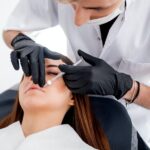Oral cancer is a serious health condition that affects the mouth and surrounding areas, including the lips, tongue, cheeks, and throat. While it can affect anyone, certain lifestyle choices and genetic factors may increase the risk. According to recent statistics, oral cancer accounts for approximately 3% of all cancer cases worldwide, but this seemingly small percentage does not diminish its impact.
Early detection and treatment are critical, making it essential to be aware of the symptoms and seek medical advice promptly. In fact, regular visits to your family dentist in Orange, CA, can help you diagnose oral cancer early and get effective treatment.
What is Oral Cancer?
Oral cancer occurs when abnormal cells in the mouth grow uncontrollably, leading to lesions or tumors. Often, these cancers are first diagnosed by dentists during routine check-ups, underscoring the importance of regular dental visits. The main risk factors include tobacco use, excessive alcohol consumption, human papillomavirus (HPV) infection, and overexposure to the sun, which may lead to lip cancer. Understanding these risks can help in taking preventive measures.
Common Symptoms of Oral Cancer
Recognizing the symptoms of oral cancer is crucial for early intervention and improved outcomes. Here are some of the main signs to watch out for:
- Persistent Mouth Sores: One of the most common symptoms of oral cancer is the presence of a sore in the mouth that doesn’t heal within a couple of weeks. These sores can be painful and may persist despite home remedies or over-the-counter treatments.
- Lumps or Thickening: Any lumps, bumps, or areas of thickened tissue in the mouth or on the lips should be examined by a healthcare professional. These growths may feel different from the surrounding tissues and can indicate a developing cancerous condition.
- Difficulty Swallowing: Dysphagia, or difficulty swallowing, is another warning sign. This may be accompanied by a feeling that something is caught in the throat or noticeable pain while eating or drinking.
- Unexplained Bleeding: Bleeding in the mouth that cannot be traced back to an injury or known condition should be investigated. Oral cancer can cause bleeding gums or tongue without any apparent reason.
- Changes in Speech: Oral cancer can affect the way you speak. Changes in voice, hoarseness, or slurred speech should not be ignored and warrant a medical evaluation.
- Ear Pain: While ear pain can have various causes, persistent pain without hearing loss can be a symptom of oral cancer, especially if it occurs alongside other symptoms.
The Importance of Early Detection
Detecting oral cancer in its early stages significantly increases the chances of successful treatment. So, regular dental check-ups play a vital role in early diagnosis. Dentists are trained to identify signs of oral cancer during routine examinations, often catching it before symptoms become severe.
It is important not to dismiss symptoms as minor ailments. If you notice any of the symptoms mentioned, especially if they persist for more than two weeks, consult a healthcare professional immediately. Remember, early intervention can make a substantial difference in treatment options and outcomes, potentially saving lives.
Conclusion
Oral cancer is a serious but often preventable disease. Maintaining good oral hygiene, avoiding tobacco, moderating alcohol intake, and protecting lips from sun exposure can reduce your risk. However, the best defense against oral cancer is vigilance. Regular dental check-ups and being attentive to changes in your oral health are crucial steps you can take.
If you notice any symptoms of oral cancer, don’t hesitate to seek professional medical advice. In fact, early detection is key, and your health is worth the extra attention. So, by being informed and proactive, you can take charge of your oral health and potentially prevent the progression of this disease.












